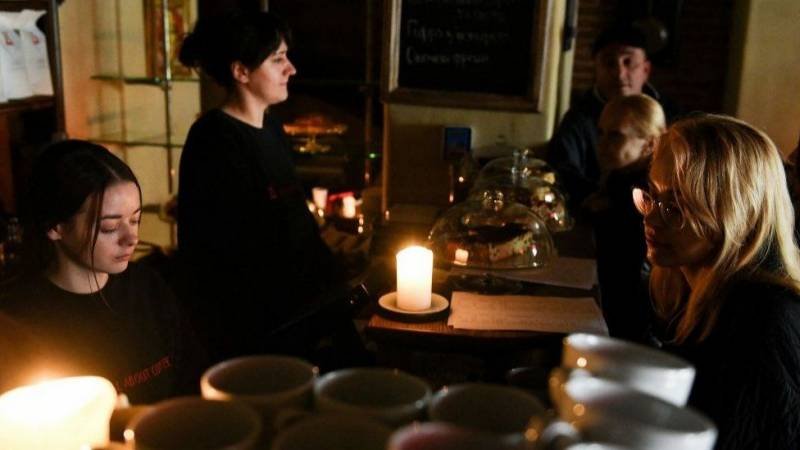On Sunday, the energy operator of Kyiv announced that scheduled power outages had been implemented in the Ukrainian capital due to Russia’s persistent attacks on the country’s power network.
According to the Ukrainian presidency, more than one million Ukrainian households are without electricity as a result of recent Russian attacks, and at least a third of the country’s power stations have been destroyed in advance of winter.
Moscow reported a new incursion on Sunday, stating that it has destroyed a storage facility in central Ukraine that held more than 100,000 tons of aviation gasoline.
Saturday evening, Ukrainian President Volodymyr Zelensky decried Russia’s “vile attacks on essential assets” after further attacks on energy facilities and power outages were reported around the country, especially in western Ukraine — far from the frontline.
Sunday, the national energy operator Ukrenergo implemented “stabilisation shutdowns” in Kyiv to “prevent accidents,” according to a statement on the website of the energy business DTEK.
DTEK stated that three groups of consumers in Kyiv will be “disconnected for a particular period of time” beginning at 11:13 a.m. (08:13 GMT) when the blackouts began.
Due to the severity of the damage to the power supply system, the duration of the blackouts could be extended beyond four hours.
DTEK underlined appeals for residents to use electricity “judiciously” and for companies to minimize their use of outside lighting.
– “Conserve your energy”
In the southern Ukrainian city of Kryvyi Rig, deputy mayor Sergiy Miliutin dealt with emergencies and power outages from his underground bunker, which also served as the venue for a children’s martial arts tournament.
“I’ve reached a point when driving is all I need to survive. You must maintain composure and conserve your strength. Nobody knows how long all of this will persist “He said to AFP.
After an explosion earlier this month partially destroyed the bridge connecting the annexed Crimea peninsula to the Russian mainland, Russia escalated its attacks on Ukraine, focusing on energy infrastructure.
The incident was viewed as a major setback for Moscow’s forces, which are fighting to contain a Ukrainian counteroffensive in the country’s south and east.
Ukraine was the topic of Russian Defense Minister Sergei Shoigu’s telephone conversations with his French, Turkish, and British counterparts.
In all three calls, Shoigu voiced “concerns about possible provocations by Ukraine involving the use of a ‘dirty bomb,'” according to the Russian defense ministry.
A governor from the eastern Donetsk region stated that three Ukrainians were killed by Russian shelling in the Toretsk district overnight.
A local governor stated on Sunday that two lines of defense had been constructed in Russia’s Kursk area along the border with Ukraine in preparation for a potential attack.
The action occurred one day after the governor of the neighboring region of Belgorod, which also shares a border with Ukraine, said that construction of defense facilities had begun in portions of the region.
The governor, Vyacheslav Gladkov, reportedly said that Saturday’s strikes in his territory resulted in the deaths of two individuals and left 15,000 people without power.
Evacuations from Kherson
The Ukrainian SBU intelligence service made a new claim of potential collusion, stating that it had detained two Motor Sich officials on suspicion of cooperating with Russia.
The SBU stated that the management of the company’s plant in the southern Ukrainian region of Zaporizhzhia, which is partially controlled by Russian forces, “conspired” with the Russian state-owned defense giant Rostec.
“The suspects constructed a transnational conduit for the unlawful delivery of large quantities of Ukrainian aircraft engines to the aggressor nation,” the SBU said, adding that Russia used the engines to manufacture and repair attack helicopters.
The power outages and fatal attacks occurred as pro-Russian officials in the southern Ukrainian province of Kherson, which Russia claims to have annexed, encouraged inhabitants to evacuate “immediately” on Saturday due to a “tight situation” at the front.
The principal city in the region, Kherson, was the first to fall to Moscow’s forces, and retaking it would be a crucial objective for the Ukrainian counteroffensive.
Kirill Stremousov, a Moscow-appointed official in Kherson, told the Russian news agency Interfax on Saturday that some 25,000 people had fled to the left bank of the Dnieper River.
Ukraine has referred to the expulsion of the Kherson people as “deportations.”
